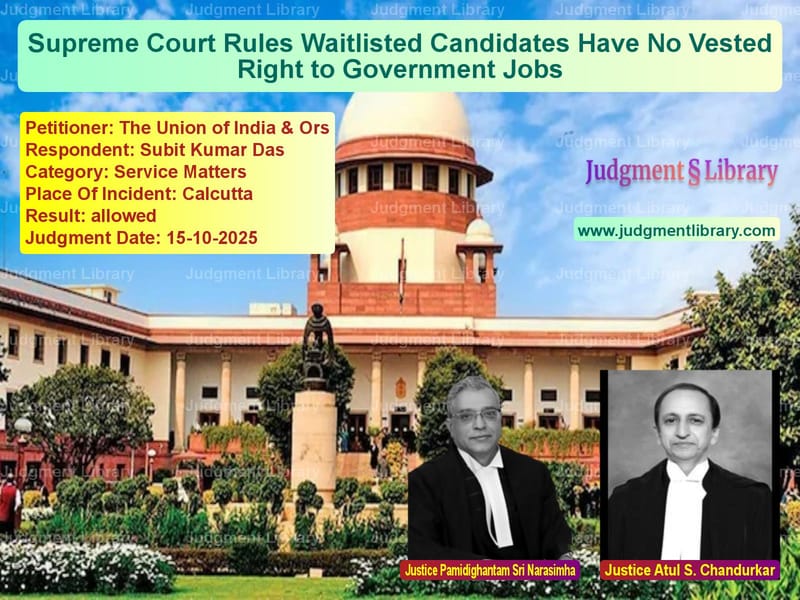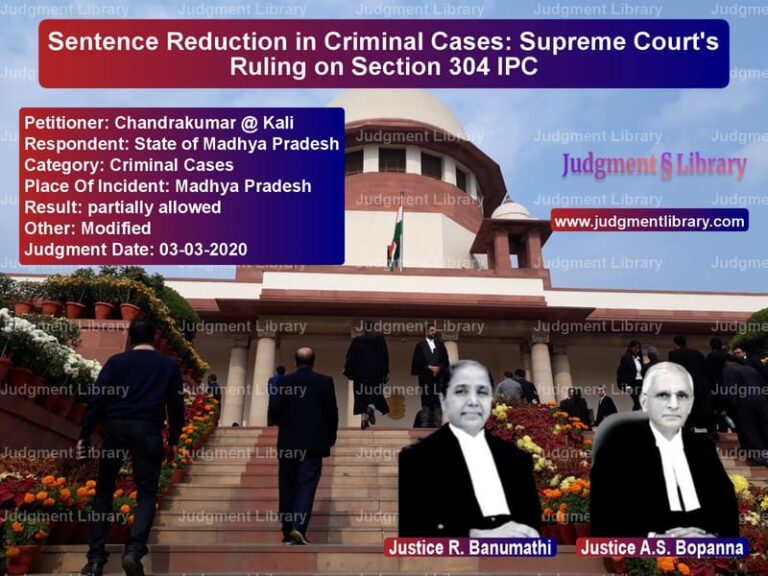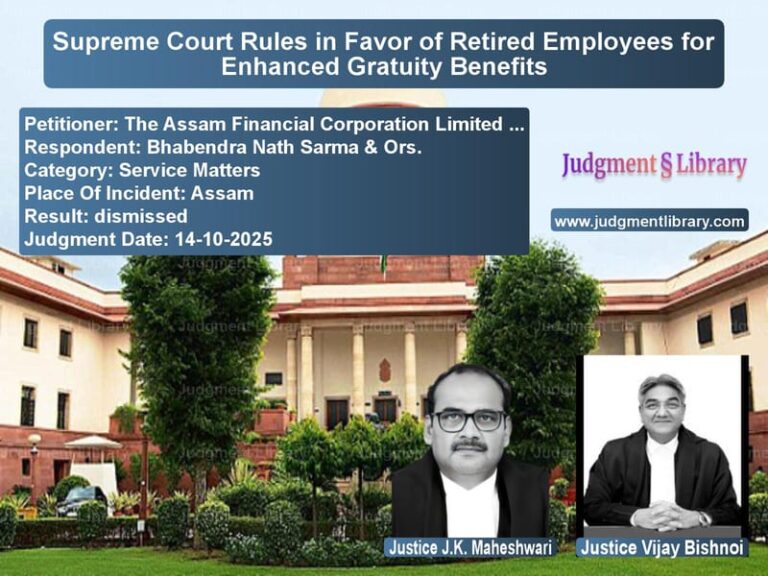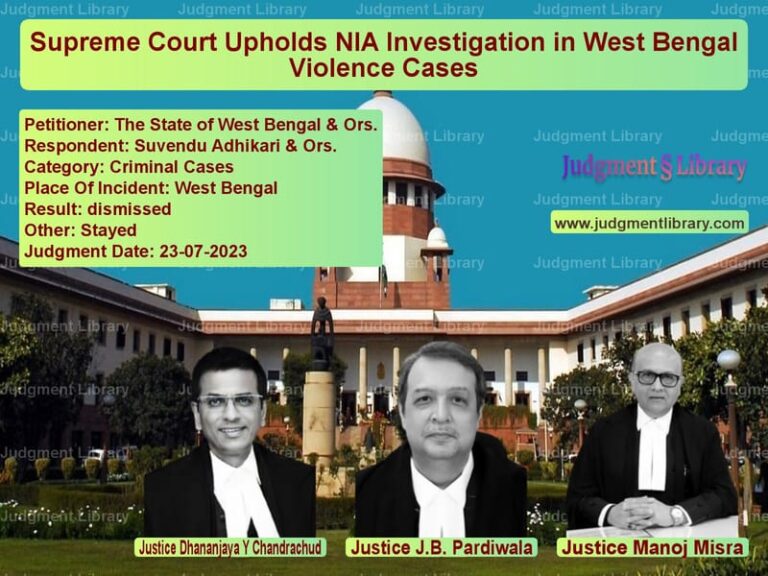Supreme Court Rules Waitlisted Candidates Have No Vested Right to Government Jobs
In a landmark judgment that clarifies the legal rights of waitlisted candidates in government recruitment processes, the Supreme Court of India has set aside a Calcutta High Court order that had directed the absorption of a candidate who had been on the waitlist since 1997. The case, which involved a protracted legal battle spanning over 28 years, centered around the fundamental question of whether a candidate placed in a reserved panel or waitlist acquires any vested right to appointment, especially when all selected candidates have joined their positions. The Supreme Court’s ruling provides crucial clarity on the limited nature of rights available to waitlisted candidates and establishes important principles about the binding nature of legal concessions made during court proceedings.
The Background of the Case
The legal saga began in 1997 when the All India Radio, Eastern Zone, initiated a recruitment process for the post of Technician. Three posts were reserved for candidates belonging to the Scheduled Caste (SC) category. The Selection Committee interviewed eleven candidates and selected three candidates in order of merit against the existing vacancies. The respondent, Subit Kumar Das, was placed at Serial No. 1 in the Reserved Panel, with the clear stipulation that candidates in the Reserved Panel would be appointed only if any of the three selected candidates failed to join the post.
As fate would have it, all three selected candidates joined their positions, leaving no vacancy for the respondent to be appointed from the reserved panel. Dissatisfied with this outcome, the respondent approached the Central Administrative Tribunal (CAT) in 1997, challenging the selection process and seeking appointment as Technician.
The Crucial Statement of 1999
During the proceedings before the Tribunal on January 15, 1999, a significant statement was made by the counsel representing the appellants (Union of India and All India Radio). This statement, which would become the cornerstone of the entire legal battle, was recorded in the Tribunal’s order as follows: “Mrs. Banerjee, Ld. Counsel for the respondents submits that till the filling up of post of technician from the reserved quota viz. 1 OBC and 1 ST is taken by the respondent authorities, the applicant’s case would not be considered. She further submits as soon as vacancy would arise against the SC quota, the applicant would be absorbed.”
This statement created an expectation that the respondent would be considered for absorption whenever a future vacancy arose in the SC category. Based on this assurance, no further interim relief was granted to the respondent at that time.
The Legal Journey Through Tribunals and Courts
The Tribunal finally decided the original application on December 9, 2004, rejecting all the respondent’s challenges to the selection process. The Tribunal held that there was no departure from the prescribed procedure, the allegation of bias was without basis, and that a candidate in the waitlist had no vested right to appointment except when a selected candidate failed to join. However, relying on the 1999 statement, the Tribunal directed the appellants to consider the respondent’s case for absorption against available vacancies.
The appellants challenged this direction before the Calcutta High Court, which in 2009 largely upheld the Tribunal’s order but removed the time limit for consideration. Meanwhile, the respondent continued his legal battle through multiple rounds of litigation, including fresh applications before the Tribunal and subsequent appeals to the High Court.
The matter reached its climax when the Division Bench of the Calcutta High Court, in its judgment dated June 25, 2024, directed the appellants to absorb the respondent on the post of Technician in any vacancy under the SC category in the Eastern Zone within four weeks. The High Court also directed that his absorption be given effect from July 19, 2013, on a notional basis. It was this direction that prompted the Union of India to approach the Supreme Court.
The Arguments Before the Supreme Court
Ms. Madhusmita Bora, learned Advocate appearing for the appellants, made several compelling arguments. She contended that “the High Court committed an error in directing the appellants to absorb the respondent on the post of Technician.” She emphasized that “the vacancy in question was of the year 1997 and admittedly the respondent was placed at Serial No.1 in the Reserved Panel. He was entitled to be considered for appointment only in the event any of the three selected candidates failed to join the post of Technician.”
Ms. Bora further argued that “the respondent was merely a waitlisted candidate and had no vested right to seek appointment.” She highlighted the absurdity of the situation by noting that “the direction issued by the High Court, if implemented, would result in a waitlisted candidate of the year 1997 being absorbed in service after more than twenty five years.”
Regarding the crucial 1999 statement, Ms. Bora submitted that “the said statement amounted to a concession in law which was contrary to the statutory Rules of Recruitment. The said statement, therefore, would not bind the appellants as the appellants would be required to disregard the Recruitment Rules for absorbing the services of the respondent.”
Read also: https://judgmentlibrary.com/supreme-court-resolves-telangana-judicial-service-recruitment-dispute/
On the other side, Mr. Rakesh Kumar, learned Advocate appearing for the respondent, strongly supported the High Court’s direction. He argued that “it was not permissible for the appellants to disregard the statement made on their behalf on 15.01.1999 before the Tribunal.” He emphasized that “as such statement was made on behalf of the appellants, no further relief was granted to the respondent by the Tribunal.”
Mr. Kumar also contended that “despite availability of various vacancies since then, the appellants failed to absorb the respondent on the post of Technician.” He further argued that “it was also not permissible for the appellants to now change their stand by stating that the respondent had crossed the age limit for being appointed.”
The Supreme Court’s Legal Analysis
The Supreme Court, in its judgment delivered by Justice Atul S. Chandurkar, began by reiterating the settled legal position regarding waitlisted candidates. The Court emphatically stated: “mere placement in the wait list does not create any vested right for being so appointed. The right to be considered for appointment would spring only in the contingency of a selected candidate not joining on his post. The wait list operates for a limited period. It cannot extend for an indefinite period and in any event after a fresh process of recruitment has commenced.”
The Court relied heavily on the precedent set in Gujarat State Dy. Executive Engineers’ Association Vs. State of Gujarat, where it was held that “A waiting list prepared in an examination conducted by the Commission does not furnish a source of recruitment. It is operative only for the contingency that if any of the selected candidates does not join then the person from the waiting list may be pushed up and be appointed in the vacancy so caused…”
The judgment further elaborated: “If the waiting list in one examination was to operate as an infinite stock for appointments, there is a danger that the State Government may resort to the device of not holding an examination for years together and pick up candidates from the waiting list as and when required. The constitutional discipline requires that this Court should not permit such improper exercise of power which may result in creating a vested interest and perpetrate waiting list for the candidates of one examination at the cost of entire set of fresh candidates either from the open or even from service.”
The Crucial Question of the 1999 Statement
The Court devoted significant attention to the legal effect of the statement made by the appellants’ counsel in 1999. While acknowledging the solemnity of statements made before courts, the Court held that “it has to be seen as to whether such statement in the form of a concession, if given effect to would result in violation of any statutory rules or regulations. If such consequence is likely to flow, it would be open for the affected party on whose behalf such concession in law was made to place before the Court the correct position of law and urge that it may not be compelled to give effect to an erroneous concession made on law.”
The Court relied on its earlier decision in Uptron India Limited Vs. Shammi Bhan, where it was held that “a wrong concession on a question of law, made by a counsel, is not binding on his client. Such concession cannot constitute a just ground for a binding precedent.”
Applying this principle to the present case, the Court observed: “In the present case, giving effect to such statement made on 15.01.1999 would result in a waitlisted candidate being given an appointment notwithstanding the fact that all selected candidates in the said recruitment process had duly joined their posts and there was no occasion to operate the wait list. It would amount to filling in one post in the subsequent recruitment on the basis of an exercise carried out in the previous recruitment.”
The Court’s Final Ruling
After a comprehensive analysis of the facts and legal principles, the Supreme Court concluded: “The available vacancies having been filled up in 1997 resulted in exhaustion of the wait list and the said process of recruitment had come to an end. The High Court has, therefore, erred in directing the absorption of the respondent.”
The Court allowed the appeal filed by the Union of India and set aside the High Court’s judgment, thereby bringing an end to a legal battle that had persisted for nearly three decades.
Significance of the Judgment
This judgment is significant for multiple reasons. First, it reaffirms the limited rights of waitlisted candidates in government recruitment processes. Second, it establishes that legal concessions made by counsel cannot override statutory rules and regulations. Third, it prevents the perpetuation of waitlists indefinitely, which could potentially block opportunities for fresh candidates.
The ruling serves as an important reminder to both employers and job seekers about the precise legal nature of waitlists and reserved panels in recruitment processes. For government employers, it clarifies that they are not bound by concessions that would require violation of recruitment rules. For candidates, it emphasizes that placement in a waitlist creates only a conditional right that extinguishes once the selected candidates join their positions and the recruitment process concludes.
In the broader context of administrative law, this judgment reinforces the principle that equity cannot override statutory provisions and that courts must ensure that recruitment processes remain fair, transparent, and in accordance with established rules, rather than being indefinitely prolonged through legal interventions.
Petitioner Name: The Union of India & Ors.Respondent Name: Subit Kumar Das.Judgment By: Justice Pamidighantam Sri Narasimha, Justice Atul S. Chandurkar.Place Of Incident: Calcutta.Judgment Date: 15-10-2025.Result: allowed.
Don’t miss out on the full details! Download the complete judgment in PDF format below and gain valuable insights instantly!
Download Judgment: the-union-of-india-&-vs-subit-kumar-das-supreme-court-of-india-judgment-dated-15-10-2025.pdf
Directly Download Judgment: Directly download this Judgment
See all petitions in Employment Disputes
See all petitions in Recruitment Policies
See all petitions in Public Sector Employees
See all petitions in Contractual Employment
See all petitions in Judgment by P.S. Narasimha
See all petitions in Judgment by Atul S. Chandurkar
See all petitions in allowed
See all petitions in supreme court of India judgments October 2025
See all petitions in 2025 judgments
See all posts in Service Matters Category
See all allowed petitions in Service Matters Category
See all Dismissed petitions in Service Matters Category
See all partially allowed petitions in Service Matters Category







